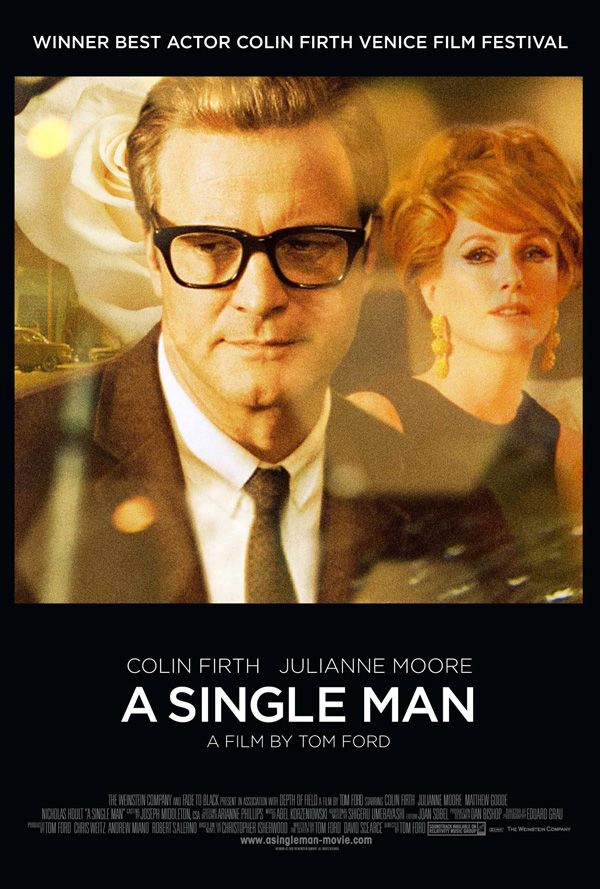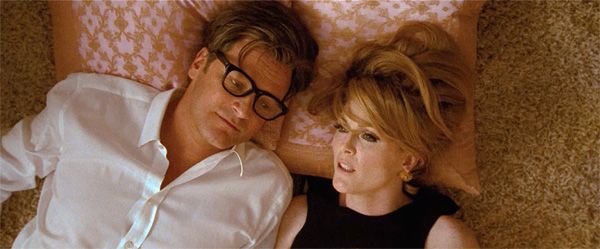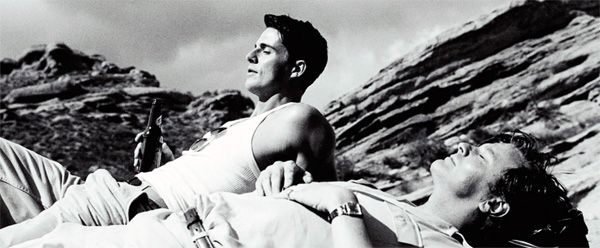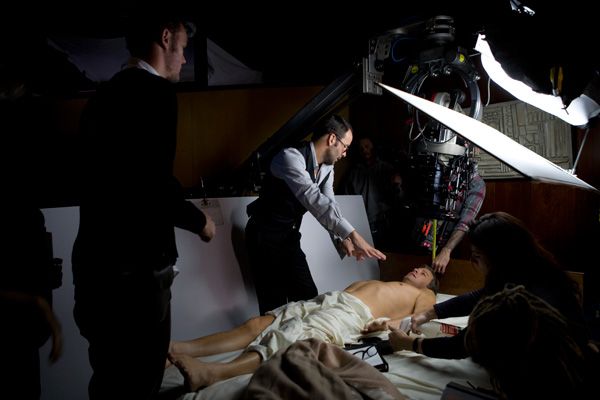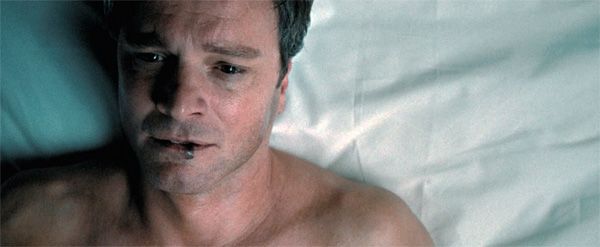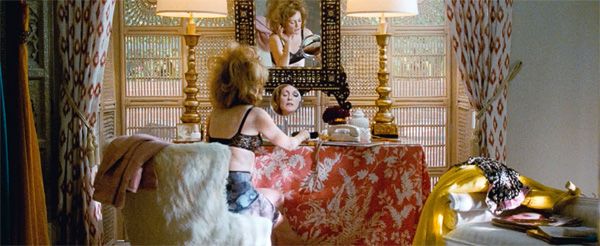While many people have heard of Tom Ford as he is a major designer in the world of clothing, he can now add something to his already impressive resume: filmmaker.
That's because opening this Friday, in limited release, is his ridiculously impressive debut film A Single Man. Set in Los Angeles in 1962, A Single Man is the story of George Falconer, a 52 year old British college professor (Colin Firth) who is struggling to find meaning to his life after the death of his long time partner, Jim (Matthew Goode). George dwells on the past and cannot see his future as we follow him through a single day, where a series of events and encounters ultimately leads him to decide if there is a meaning to life after Jim. George is consoled by his closest friend Charley (Julianne Moore), a 48 year old beauty who is wrestling with her own questions about the future. A young student of George's, Kenny (Nicholas Hoult), who is coming to terms with his true nature, stalks George as he feels in him a kindred spirit.
To help promote the film, the Weinstein Company recently held a Los Angeles press day and I was able to participate in a press conference with Ford. He talks about how he came to the material, why he wanted to make the film, casting, the technical side of filmmaking, and a lot more. It's a great interview for one of the best films I've seen this year. If and when it plays in your area, seek A Single Man out, as Colin Firth gives an amazing performance and Tom Ford demonstrates he's a natural at filmmaking.
Before reading, please know parts of the movie are discussed that some might feel are spoilers. You have been warned.
Question: How difficult was it to convince actors to be a part of this since it was your first film and how much leeway did you give the actors in their performances?
Ford: I gave them a lot of leeway because I think one of the things, or well first of all and I don't really want to talk too much about fashion because it's very, very different for me in terms of what this was and why I did this and why I hope to keep doing it and was sort of expression it was but there is a certain similarity in that fashion it is a more collaborative field than one might think. You get used to working with [others]. You have to have an idea. You have to have a vision. You have to communicate that to a team of people to help you realize that vision and you have to create an environment that allows those people to give the very best that they can give. So to answer your question about the actors, I was lucky enough to have great actors and I tried to create an environment where they could perform to make them feel comfortable, to get the very best that I could get out of them to make each one of them want this to be the best performance that they could possibly give.
Question: And how was it getting these actors to get onboard? I know Julianne Moore was the first to sign on.
Ford: I don't want to sound...it wasn't hard. I sent them a screenplay. I wrote that part really hoping that Julianne would respond to it. She did. She emailed me back immediately. Colin [Firth]. He had been my absolute first choice. We have the same agent and I checked on his availability at the very beginning and they said, 'Forget about it. He's doing this. He's doing that and that.' I went on and had another actor cast in the role and I ran into Colin at the 'Mama Mia' premiere in London. I was standing there chatting with him, knowing that I didn't have him, that I was working with another actor who's a great actor and I was looking Colin up and down and I was just thinking, 'Oh, God. I can't believe you're not going to be George. You're so perfect for this role.' A few weeks later the other actor dropped out and I immediately got Colin's email address. I emailed him out of the blue and FedEx'd him a script. He read it and emailed me back the very next day. He had a couple of questions about it. I jumped on a plane and flew from New Mexico where I was to London. I was there for eighteen hours. We had dinner. He came over to my house. I walked him through everything. I had a lot of visual images to show him and we talked a lot about the concept for the film. Basically by the end of the evening we had a handshake deal. So I like to think that the actors responded to the script.
Question: Was there a specific reason that you cast an English actor to play an American?
Ford: I didn't set out to find English actors to play Americans and Americans to play British roles. It was really that Julianne was someone that I had wanted to work with and she seemed so right for this character even though she wasn't English, and as I said, she was the first actor to be cast. George I felt really did need to be English. I don't know why I felt that but I did. I live in England half of the time so maybe my radar was tuned to British actors maybe more than if I'd been in America. But there wasn't really a reason that I cast English actors to play Americans.
Question: Looking at the movie and this story we'd like to think that we've come a long way since the '50's.
Ford: '60's. Well, it was still really the '50's because it was the '50's until Kennedy was assassinated. We were living on the surface in the same era.
Question: And there's a long way to go with things like Prop 8.
Ford: Which happened the night while we were shooting that.
Question: How far do you think the gay community has managed to come in our time?
Ford: I think we've come a long way. I also think that Christopher Isherwood was way ahead of his time. One of the things that I always loved about his writing was the matter of fact way that he treated homosexuality. Most of his stories and novels were autobiographical and so there's usually a gay character but that's not the center of the story. The gay character is portrayed as a human being who lives a life and the relationship between George and Jim, I felt that it was very important to depict that in a very matter of fact way, that they were just really two people who are in love with each other. I wanted this not to be a gay story or a straight story but to be a human story. I think the more we see that and realize that love between people is love between two people that the better off we'll all be for that.
Question: Them feeling that they had to remain in the closet is definitely one of the walls that we've broken through.
Ford: Absolutely and we did have the period [for that]. You only sense it a couple of times; when he's not invited to the funeral because he's not family and the biggest time really is when Julianne, his very best friend who's known him for years, Charlie, says to him, 'Don't you miss this, what we could've been, having a real relationship and kids?' That to me, if I were George, would've been the thing that stung the most, that someone so close to you still didn't really understand the relationship that you had with someone else. So, yes, it was certainly because of the time a part of it but it wasn't meant to be the real focus of the story.
Question: You have a long term partner.
Ford: Twenty three years.
Question: How did that affect you as you wrote this story?
Ford: Well, I think that anyone with a long term partner with anyone that you love, the idea of losing someone that you love could throw you into a situation where you could not see your future and you really would be living in the past. That's what happening with George. As I understand it from Don Bachardy, Christopher's partner, Christopher wrote this story when Don left him for about eight months and moved to New York with someone else. Christopher imagined that Don had died and that he was alone and he wrote this story.
Question: The point I'm making is that there's a lot of sensuality to the film and not just the sex part -
Ford: There is no sex.
Question: But can you talk about juxtaposing those two things?
Ford: Well, first of all it's about life. For me the film isn't at all about death. I would love it if you wouldn't give away the ending but the end of that film is the end of all our films. It's the end of your film. It's the end of my film. That's what happens. That's what comes to us. This movie is really about living in the moment, appreciating the small things in your life that sometimes just go by without you really observing and understanding your connection to the universe and understanding that relationships with other people are really the things that matter. When George decides to take his own life all of a sudden the beauty of the world starts to pull at him because he's really looking and seeing for the first time. We have so many eyes in the film because George hasn't been looking people in the eyes. He's been blank. Now, all of a sudden he's connecting and people are responding to him in a different way. He's responding to them and...things are falling from the ceiling. It's a giant roach. That is a huge cockroach. Wow. [laughs] What a brave guy you are! We're Buddhists here! Don't kill it. Put it outside. I'm sorry. Getting back to your question, I don't know if I answered it but this film is not about death. It's about life.
Question: In your intention to make about it life is that why every detail seemed so planned on your end?
Ford: Well, there are a couple of different reasons for that. George is a character who keeps himself together by keeping his outer world in order. This is how this man exists. This is how he gets through the day. On the worst day of his life he's polishing his shoes. He's putting on his tie. He's just being held together by the surface and by the order of everything. Not to be too, this might sound silly to some of you - I don't know - but Christopher Isherwood was a Vergo. Vergos are precise, almost uptight. It's all about precision and order and I'm a Vergo. Colin Firth is a Vergo. This was the Vergo, Vergo, Vergo film. But it's also very much a part of his character, written into the original book. This is a man who's inner world and outer world are connected. He feels that if he can keep his outer world together that he won't collapse inside. Colin's character has a veneer but just inside is this romantic guy who's suffering so much and it's right behind the surface.
Question: Now that you've started this second profession while keeping at the fashion, I'm curious about what you saw yourself doing as a child?
Ford: God. I thought that I was going to be an actor. I actually studied acting at NYU and I made a lot of television commercials which is how I put myself through college. I quickly realized that I didn't want to be an actor because I didn't feel secure enough at that time. I remember doing a Purell shampoo commercial when I was nineteen and this kind of bitchy hairdresser said, 'You're losing your hair. It's all going to fall out.' I just remember becoming so paranoid about my appearance that I wasn't a good actor because I was too self-absorbed and nervous. I realized that wasn't going to happen for me so I went back to school and studied architecture and fashion and now I've sort of ended up here. But when I was a kid I thought that I was going to be an actor.
Question: The nudity in this film is so tastefully done. Was there ever more consideration to going full frontal like you've done in some of your ads?
Ford: You could have but if you know anything about my career in fashion it has been very much about full frontal male nudity and full frontal female nudity and sexuality and sex. I think that a lot of people think that's all I'm about and they understood that surface. This for me is a story about love and a story about romance and had there been a need for that kind of nudity then sure, but there wasn't that need and it didn't seem to come from the story. So that's why it's not there.
Question: Can you talk about the color pallet that you chose?
Ford: Well, it was to help us understand what George was feeling. At the beginning of the day he's depressed. Everything is flat. Color is flat. He's not seeing color. His flashbacks are vivid in his mind because there are moments when he's alive and so when he's thinking about to these moments, even the terrible moments like when he hears that Jim's died there is color because it's vivid in his memory, other than the one that's in black and white. The reason that's in black and white was that he was taking the pictures of Jim that day in black and white. He was thinking in black and white and so for him that entire memory is black and white. The color heightens when George really starts to look at thing and the beauty of things starts to pull on him. I had a friend who was dying of cancer and I remember him telling me that snow didn't look like he'd ever noticed it looking, everything, because he was seeing these things for the last time and he knew he was going to die. Things took on an almost surreal quality. So I wanted the audience to feel that, to experience what George was feeling and as the beauty of the world starts to pull on him, by the time that we're at the end of the film he's living in Technicolor, very vivid. That was the point of the color.
Question: There's a very languid style to the film, the male form and it's variations. Since this is very close to you, I wonder if all of that was intentional or just sort of an occurrence?
Ford: It was very intentional and I had done a lot of research just photographically building the characters. I had a binder for each one of them that I put together even while I was writing the screenplay. Then certain things in the binder actually ended up working their way into the screenplay because visually they made sense for the character. So I knew who these characters were, where they lived. George's house for example, he moved to America because he loved the fact that when you came to America you could make something of yourself no matter where you came from. So he would've wanted a dynamic and modern house. Yet he's a professor who grew up in England in a dark paneled room with a fireplace and a scotch in one hand. So the kind of modern house that he would want would have to be warm, dark, cozy. So I spent a lot of time looking for just that right house to help the character, to help Colin as an actor understand his character and to help us understand the character.
Question: I know in the book he's in his head a lot.
Ford: The whole time, yeah.
Question: How did you go about deciding when to use voice over and when to not use it?
Ford: I originally didn't write any voice over at all. I added that voice over after I had cut the film and I realized that I needed those punctuations. I started out trying to have no voice over. I don't know how said it, or maybe many people have said it, but a film, since it is primarily a visual medium, should really be like a silent film. You should be able to watch something and understand what was going on and use voice when you need to communicate something you can't necessarily communicate visually. The book is the opposite. The book is an inner monologue which is beautiful, one of the most beautiful books. If you haven't read it you should read it, but nothing happens in the book. If you were to just take the book and put it on film you wouldn't know what was going on because there's nothing external happening to help you understand what's going on. So I had to create external scenes so that we would understand what George was thinking and what he was going through.
Question: I loved seeing Don Bachardy in that cameo. How was it having his old lover on set?
Ford: It was wonderful and he contributed a lot because whenever I had a question about something, like for example I wrote Julianne's character in a much more glamorous way than she's depicted in the book. I said, 'Don, do you think I've gone too far by doing this?' He said, 'The funny thing is she was based on Iris Tree who was very stylish.' He pulled out all these pictures of Iris Tree and he said, 'Christopher didn't want her to know that she was the inspiration for this part so he changed her physically, but this is who the real woman was.' That of course made feel better about altering that character to the extent that I did. So it was great to have Don and it was great to have Don's vote of confidence. I think that he genuinely loves the film and is very happy. So that makes me very happy.
Question: There's a lot of echoes in the house -
Ford: Well, the closeness but they're very, very different. You mean Chris and Don's house?
Question: Sitting in the kitchen is a little bit like the living room into the back area there.
Ford: It felt very different to me but the closeness of the house and the closeness of their own house which is the house that's described in the book was something that I was looking for.
Question: Can you put your finger on why Colin was always your George?
Ford: That's a hard question to answer. I think that I've always seen this character in Colin whenever I've seen him in anything, no matter what it was. Colin is such an amazing actor, and I'm not saying that he's had small parts because he's done some wonderful things in his life, but even in the smallest thing that you've ever seen Colin in there's something that comes from inside him. He's able to telegraph his thoughts or what his character is feeling, whether it's real or not I don't know. I don't know enough about his process but he's able to telegraph that with almost no movement to his face. There's something about Colin that does seem very contained on the surface and yet inside you know there's enormous emotion. That seemed absolutely perfect to me for George. So I think it was a case of actor and character very, very well suited. And Colin also, I mean I can't say enough great things about Colin. He really inhabited that character. I can't imagine anyone else in that role and it was fate and luck that put him there.
Question: You had a main actor pull out but also for the role of Kenny, another actor pulled out, right?
Ford: He didn't show up the first day that he was due and he's a well known actor. I'm not going to say his name. He was attached for six months and we'd made his costumes. Yes. But again it was so lucky and I cannot imagine anyone else in that role but Nicholas Hoult. I had seen Nicholas's tape a few weeks earlier and similar to running into Colin at that premiere in London I was kind of thinking to myself, I had a sick feeling inside that this guy was perfect for it and that I was working with another actor. It just came together.
Question: What do you feel is the essential fabric of film?
Ford: Essential fabric? Are we talking tweed? You have to have a story that's worth telling. You have to have something that you're passionate about. I understand what I'm about as a fashion designer but when I decided that I wanted to make film I had to say, 'Well, why? Who cares? What do I have to say?' So, first for me, and I think that everyone can answer this question differently - I think that if you ask this question of other filmmakers they would all tell you something different because a film should be somewhat personal. I think that whatever you create you have to be true to yourself and create something that feels right to you. So the story is number one to me. Style. People talk about it being stylish and beautiful, that's at the service of the story. Style for me means nothing without substance, and yes, there are moments and things about the film that are stylish but hopefully at the service of the story. I don't know if I answered your question but I tried.
Question: Anything that you can say about your planned women's wear line that's coming out?
Ford: No. I'm not talking about fashion. I'm here as a filmmaker today. I'm not talking about fashion.
Question: How did this process compare to fashion?
Ford: Well, the process as I explained is a little bit the same. You have to inspire people and get the best out of them.
Question: Do you know what's next for you in film?
Ford: No. I have something that I'm working on but I need to get a little distance from this. I just finished editing it in August and we've had all the film festivals and I need a little bit of space.
Question: Is there an iconography for Colin's wardrobe that you used? It reminded me of a '60's Michael Caine.
Ford: That's a good reference.


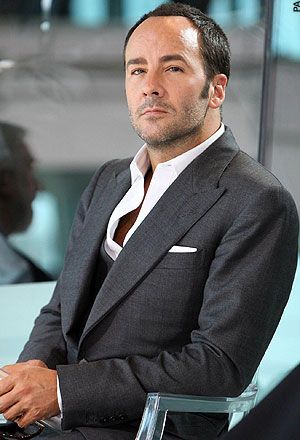
.jpg)
.jpg)
